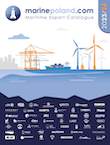I wish I could look at the whole field of wind turbines from the windows of my home. I just love it – said the co-founder of Apple’s success, Steve Wozniak at the symposium of the American Wind Energy Association. Let’s hope that the enthusiasm of Steve Jobs’s partner will be shared by the inhabitants of Pomerania. The first offshore wind farms zone licenses within Polish waters have already been announced and in the next few years we shall finally see windmills on the horizon. The project will generate strong demand for innovative technologies for offshore wind energy sector. Addressing industry\'s needs, scientists are consolidating existing research facilities for offshore in Pomerania.
Together for the win
According to the PSE Operator’s (Polish Power System) plans, 3 000 MW of power generated by offshore wind farms will be connected to the grid by 2025. These projects will be a great challenge for all parties involved in the development process. What is a great news for the Pomeranian economy, local companies are already competent in this field. Despite no previous experience in constructing wind farms at the Polish coast, scientific institutes have long been gaining international experience in research aimed at solving offshore problems. The best example is a project coordinated by the Institute of Fluid Flow Machinery from the Polish Academy of Sciences (IMP PAN) whose aim is to reduce the failure rate of offshore wind turbines. Wind turbines are installed at a considerable distance from the coast. As a result any failure or accident causes a break in the process of energy production and a very expensive repair is needed – explains Marcin Łuczak PhD in technical sciences – Very often the repair team has to wait for the weather to clear up before any action can be taken. The daily operating costs of a wind farm maintenance vessel is about 100 thousand euro. It is obvious then that the less is spent on maintenance of the turbine, the lower the cost of energy is. The issue is serious enough to engage the most recognized scientific institutions in Europe to work on new solutions (Risø DTU from Denmark, ECN from the Netherlands, NAREC and TWI from the UK, NTNU from Norway and CTO from Poland – its partners include MORCEKO and CENER from Spain). The entrepreneurs that are involved in the project are the biggest producers of wind power components. The list includes SSP Technologies (manufacturer of blades for offshore wind turbines), Hansen Transmission (gear manufacturer) and the Gdansk Shipyard (wind towers). The project involves 23 partners from all around Europe. Results of this study will be applied into turbine components manufactured by industrial partners - adds Marcin Łuczak.
“University without walls” – interdisciplinary offer for business
Aiming at the development of offshore wind energy in Poland, IMP PAN joined forces with four other research centers and formed Maritime Center of Eco-Energy and Eco System (MORCEKO). This is a new interdisciplinary and integrated center of excellence designed especially for the development of marine energy. The founders of the centre include IMP PAN, Institute of Oceanology of the Polish Academy of Sciences, Ship Design and Research Centre, Marine Institute and Gdansk University of Technology. MORCEKO is also supported by the Pomeranian Special Economic Zone. The third pillar of the consortium will be formed by the representatives of the industry. MORCEKO embodies the idea of “university without walls” that combines competences and knowledge gathered in various institutes in order to create an interdisciplinary offer for the offshore industry. This kind of consolidation is necessary due to the fact that none of the partners alone disposes of sufficient expert knowledge to comprehensively support the offshore energy industry. On the other hand, as long as all the partners involved in the project stay united, complete knowledge on all the aspects of offshore wind energy is at hand. This includes issues such as marine ecosystems, spatial planning in the marine areas, aerodynamics and materials science (so relevant for the production of blades or for designing and testing vessels used for the installation of wind turbines at sea). The center aims at creating an advanced research infrastructure for industrial purposes.
Is it going to be practical?
One of the most interesting ideas that have been already presented is building a research platform in the future wind farms zone, around 40 km from Słupsk. A similar platform FINO I has been operating since 2003 in the North Sea, around 45 km from the island of Borkum, Germany. Meteorological data collected by the devices placed on the platform will allow investors to reduce risk at every stage of designing and erecting wind farms and then operating in those locations. This kind of information can also prove useful
while defining cost-effectiveness and efficiency of the installed turbines. Any mistake means high costs – installation cost per turbine is around 3 million euro. The centre will also develop technical prototype devices for individual companies. Cooperation with MORCEKO means new research funding possibilities for companies from the industry. The primary objective of undertaking any cooperation between science and
industry is the practical usage of research results. This means that project objectives are defined by companies due to their specific needs – says Marcin Łuczak.
Why to work with MORCEKO?
MORCEKO offers a comprehensive response to the emerging business demands and will certainly bring benefits to investors, developers and local companies. The coordinator of the project, Martin Łuczak, says,
Co-operation between science and business will bring benefits to all the parties concerned and especially to entrepreneurs as they can gain access to knowledge and laboratories that have been unavailable in their R&D departments so far. Thanks to implementing research results, companies will be able to offer innovative products and services and therefore successfully compete on the market.
ANNA KAMIŃSKA
Project Manager
Energy Sector
WWW.INVESTINPOMERANIA.PL
source: magazin Live&Travel 07-2012


